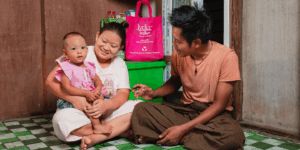
Dear Friend of DKT,
We are pleased to share a new piece of research in five countries for which we have assessed DKT’s contribution to overall contraceptive prevalence. This is part of DKT’s effort to find ways to tell stories about DKT’s impact beyond sales and CYP statistics.
The results are extremely encouraging.
This research, undertaken by an independent team at John Hopkins University, examined DKT’s impact and results and compared it to the overall contraceptive use in select countries. DKT’s results were limited to organic, commercial sales and did not include DKT’s sales to other NGOs and government bodies, ensuring no double counting by other parties.
As I read through the report, I made a few interesting observations I’d like to share.
- In the Philippines, where DKT contributes an estimated 42% of contraceptive prevalence, the flat line underscores an important trend. It’s a story that reflects the fact that DKT’s contribution has been fairly stable while CPR has edged upwards. DKT has crowded in other users, supported overall growth through our advertising and education, and created space for other players (including the public sector) to act.
- The Pakistan case reflects strong growth over the last 10 years; DKT now provides approximately 27% of CPR and we expect that to continue. A note that DKT has provided nearly all the IUDs to the government and most NGOs in Pakistan; that contribution is not reflected here.
- In Mozambique, where DKT’s contribution has recently moved upwards to 12%, we believe that the very low per-capita income, combined with a strong reliance on the public sector, have been factors in DKT’s growth.
- Uganda and Senegal are fairly new programs but pointed in the right direction at 8% and 9% respectively.
DKT has worked hard over the last couple of years to do more such research to demonstrate our scale and impact in various ways. Below you will find links to other research and white papers that reflect this effort.
Thanks for your interest in our work. We are always happy to answer questions.
Cheers,
Chris Purdy
Estimating DKT’s contribution in Mozambique, Pakistan, the Philippines, Senegal, and Uganda (2012-2023)
DKT International is proud to release “Estimating DKT’s Contribution in Key Countries: Part II,” which provides evidence of our strategic approach to contraceptive social marketing — a strategy that has been instrumental in increasing access to global, modern contraceptives across low- and middle-income countries (LMICs). The report is the second in a series of analyses produced in collaboration with Dr. Ian Salas and the William H. Gates Institute for Population and Reproductive Health at Johns Hopkins University. The first analysis was released in January 2024.
Our initiatives have expanded family planning options for individuals in underserved communities while significantly reducing barriers to reproductive healthcare. This publication examines DKT’s effect on global markets with a data-driven focus, showcasing five of DKT’s initiatives in sub-Saharan Africa and Asia: Mozambique, Pakistan, the Philippines, Senegal, and Uganda. The data shows that DKT’s work has contributed to measurable increases in contraceptive prevalence and driven overall market growth, providing actionable data for a greater understanding of DKT’s influence in local markets and underscoring the organization’s central role in sexual and reproductive health worldwide.
Explore the full report and download below.

Contraceptive Use: Estimating DKT’s Contribution in Key Countries Part 1


In January we released the first study in our series which revealed that DKT plays a key role in providing SRH products and services in countries where it operates. This contribution varied, ranging from supplying 7% of contraceptive users in some of the newer markets – Kenya and Cote d’Ivoire, to 35- 40% in the Democratic Republic of the Congo (DRC), Ghana, Nigeria, and Indonesia.
In some markets, DKT’s contribution to additional users was found to be greater than Track 20’s total number of additional users, suggesting that DKT programs have both grown national contraceptive markets and that an increased share of users in some markets are turning towards DKT for consistent contraceptive supply.
A copy of that study can be found on the DKT website.
Medical Abortion (MA) Customer Journeys in Ghana and Nigeria

“A Customer’s Journey: Knowledge, Procurement, Use and Likely Future Use of Medication Abortion (MA) in Ghana and Nigeria,” delved into the crucial role of understanding women’s experiences with medical abortion (MA) in hopes of improving abortion care in Ghana and Nigeria. Through digital surveys conducted via social media, DKT International partnered with Sohail Agha and the Behavioral Insights Lab (BiL) to gather data on MA awareness, purchase, and use.
Key findings showed that awareness of MA is highest amongst women in urban areas and amongst the poorest women, highlighting MA’s potential as a “pro-poor” intervention. The study also emphasizes the significant role of private sector outlets like community pharmacies in Ghana and PPMVs in Nigeria for providing access to MA, especially for economically disadvantaged women.




